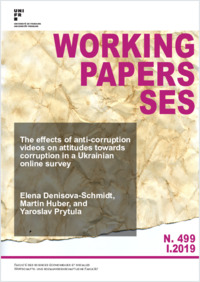The effects of anti-corruption videos on attitudes towards corruption in a Ukrainian online survey
BP2-STS
-
01.01.2019
25
English
This paper presents the outcomes of an anti-corruption educational intervention among Ukrainian students based on an online experiment. More than 3,000 survey participants were randomly assigned to one of three different videos on corruption and its consequences (treatment groups) or a video on higher education (control group). The data suggest a high level of academic dishonesty and misconduct among young people, but also a negative attitude towards corruption in general, highlighting the ambivalence of corruption in the country. We find that one video, which presented a thrilling story about a victim of corruption related to common bribery in an accessible way, was effective in promoting awareness of the negative consequences of corruption. In contrast, the other two treatment videos, which more closely followed the style of TV news or documentaries on corruption, did not generally promote negative attitudes towards corruption. Presenting corruption issues in a catchy way therefore appears to matter for the effectiveness of such interventions.
- Collections
- Faculty
- Faculté des sciences économiques et sociales et du management
- Language
-
- English
- Classification
- Economics
- Series statement
-
- Working Papers SES ; 499
- License
- License undefined
- Identifiers
-
- RERO DOC 323799
- RERO R008885051
- Persistent URL
- https://folia.unifr.ch/unifr/documents/307402
Statistics
Document views: 185
File downloads:
- WP_SES_499.pdf: 288
